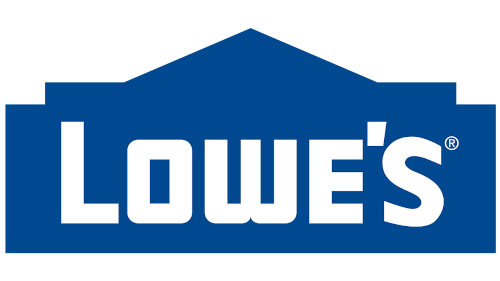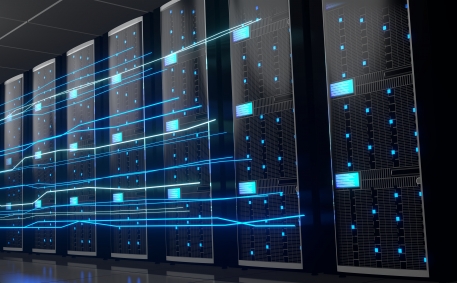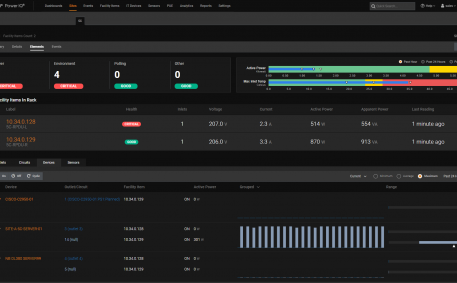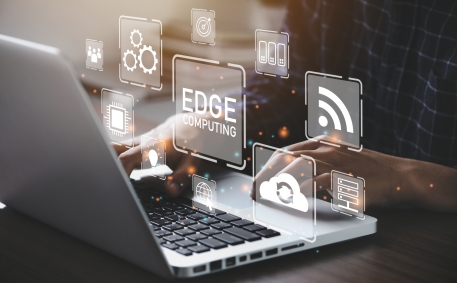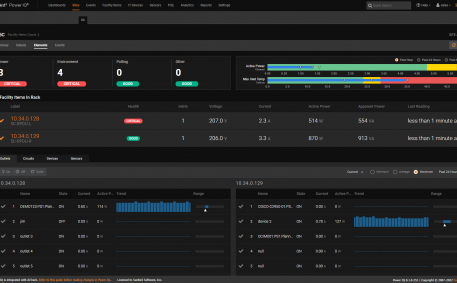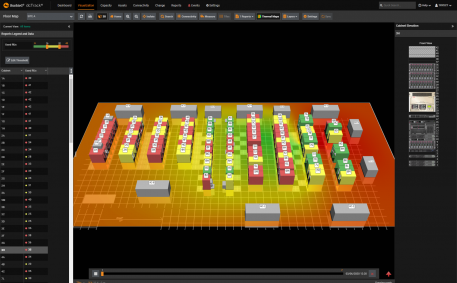-
We are thrilled to congratulate Türk Telekom for their outstanding achievement in winning the DCIM/DC Management Innovation of the Year award at the DCS Awards 2024. This recognition is a testament to their exceptional commitment to innovation, customer satisfaction, and operational excellence in the data center industry.
The DCS Awards recognize success stories, technological advancements, and significant contributions in the data center industry. In a year marked by challenges such as sustainability concerns, skill shortages, supply chain disruptions, and the rapid evolution of AI, DCS acknowledges that the industry continues to demonstrate remarkable resilience and ingenuity.
Innovating...
-
Data center environmental sensors helps data center managers maintain uptime, increase energy efficiency, and remotely manage their data centers.
From temperature and humidity to other parameters like airflow, these sensors can be paired with modern data center management software to provide real-time insights and alerts, enabling proactive management and rapid response to potential issues.
There are many types of sensors and vendors on the market. If you are researching or planning to deploy data center environmental sensors, start by familiarizing yourself with this alphabetical list of some of the most popular sensors available.
Data Center Temperature Sensors
Constantly monitoring the...
-
Investing in Data Center Infrastructure Management (DCIM) software is critical for modern businesses to efficiently manage their data center resources.
Without DCIM software, organizations lack comprehensive visibility into their data center infrastructure, making it challenging to identify and address issues promptly, leading to potential service disruptions. Moreover, the inability to effectively understand current infrastructure utilization and plan for future growth can hinder business agility and competitiveness in today's fast-paced market.
In this blog post, we will explore the risks of operating without DCIM software, consider the cost of DCIM software in the context of overall data...
-
We’re proud to announce the general availability of Power IQ® 9.1, the latest version of Sunbird’s DCIM Monitoring software. This release includes exciting new features including load shift detection, enhanced Raritan and Server Technology bulk firmware update, and residual current monitoring (RCM) Type B.
Power IQ 9.1 Availability
This Power IQ 9.1 update is available worldwide on a subscription or perpetual license basis to all customers with valid maintenance contracts. Download the update file from Sunbird’s support portal to upgrade today.
If you would like to try a full-featured test drive of Power IQ, get your login credentials to the free online demo system now.
What’s New in Pow...
-
In recent years, sustainability has become a top priority for industries worldwide, and the data centre sector is no exception. As governments strive to reduce carbon footprints and mitigate climate change, regulatory directives such as the Energy Efficiency Directive (EED) and the Corporate Sustainability Reporting Directive (CSRD) are playing a crucial role in reshaping how data centres operate and manage their environmental impact.
Explaining EED and CSRD
The Energy Efficiency Directive (EED) and the Corporate Sustainability Reporting Directive (CSRD) are pivotal pieces of legislation within the European Union (EU), designed to drive energy efficiency and sustainability across various s...
-
Data centers are the backbone of our increasingly interconnected world. They power everything from streaming services to AI, handling vast amounts of data every second. However, this technological advancement comes at a cost, with energy consumption being a significant concern. In fact, data center energy consumption is forecasted to double by 2026.
As we venture further into 2024, it is important to review some of the key trends around energy consumption in data centers.
AI is Driving Data Center Demand
Artificial Intelligence (AI) is not just posed to revolutionize data center operations; it's also fueling a surge in energy consumption since AI GPUs consume four times more energy than mo...
-
It’s getting more expensive to rent space in colocation data centers.
According to CBRE, colocation rates are up 18.6% year-over-year to a record $163.44 per kW/month due to limited supply and strong demand.
Average Asking Rental Rate with Y-o-Y % Change for Primary Markets
*Rental rates are quoted asking rates for 250-500 kW at N+1/Tier III requirements. Image Source: CBRE Research, CBRE Data Center Solutions, H2 2023.
As colocation costs increase, data center professionals must understand their power pricing model, have clear goals for how they will contain costs, and implement power metering and monitoring technologies to meet their objectives.
Understanding Colocation Power Pricing Mod...
-
Europe is currently striving to be the first climate neutral continent by introducing a package of policy initiatives called the European Union’s (EU) Green Deal. This deal was introduced in 2019 and focuses on reducing greenhouse gas emissions by at least 55% by 2030, compared to 1990 levels.
The Energy Efficiency Directive (EED) was also launched which aims to decrease energy usage by 11.7% by 2030. Starting in May 2024, data centers that use more than 500kW are legally required to report on energy consumption metrics from the previous year into a European database.
In 2018, data centers accounted for 2.7% of electricity usage across the EU and could rise to 32.1% under current trends if...
-
In the dynamic landscape of data center management, staying ahead of regulatory changes is paramount. As the push for sustainability intensifies, European data center professionals are facing a new challenge in the form of Regulation 2023/1542. This regulation mandates reporting on battery recycling by mid-2025. Let's delve into what this means for data centers and how you can prepare.
The European Green Deal, a landmark initiative aiming for a sustainable economy with net-zero greenhouse gas emissions by 2050, underscores the urgency of environmental action. With a focus on electrification and renewable energy, the proliferation of battery-powered technologies has soared. However, this tran...
-
Edge data centers are transforming the way we process and deliver data, catering to the skyrocketing demands of modern applications and services.
The global edge computing market size was recently valued at USD 11.24 billion and is projected to expand at a compound annual growth rate (CAGR) of 37.9% from 2023 to 2030.
By 2025, more than 75% of all enterprise-generated data will be created and processed outside of the traditional data center or cloud.
Are you ready for the proliferation of edge sites and the challenges that may come with managing that infrastructure? Keep reading for a primer on edge data centers and how to manage them.
What Are Edge Data Centers?
An edge data center is a s...
-
As rack densities in data centers increase to support power-hungry applications like Artificial Intelligence and high-performance compute (HPC), data center professionals struggle with the limited cooling capacity and energy efficiency of traditional air cooling systems.
In response, a potential solution has emerged in liquid cooling, a paradigm shift from traditional air-based methods that offers a more efficient and targeted approach to thermal management.
The data center liquid cooling market is expected to grow by over 24% annually over the next five years as organizations seek ways to support high-density infrastructure and meet sustainability objectives.
Keep reading to learn the basic...
-
As data centers grow more complex and power-hungry, rack PDUs are an increasingly important component of data center power circuits.
Modern intelligent rack PDUs have many advanced features and work seamlessly with Data Center Infrastructure Management (DCIM) software to provide a complete solution for monitoring and managing data center infrastructure.
Let’s delve into the key trends shaping rack PDU management in 2024 and beyond.
Top Rack PDU Management Trends
1. Increased Adoption of Intelligent Rack PDUs
Basic or “dumb” rack PDUs are no longer sufficient in today’s data center environments. Without providing power usage data or any additional capabilities beyond basic power distribut...
-
dcTrack® 9.2.3 is now available with exciting new features like the UniversalConnector G2 to drive automation via integration. Read all about dcTrack 9.2.3.
We’re proud to announce the general availability of dcTrack® 9.1, the latest version of Sunbird’s DCIM Operations software. This release includes exciting new features including enhanced blade chassis visualization, custom fields for models and locations, and easier status changes.
dcTrack 9.1 Availability
This dcTrack 9.1 update is available worldwide on a subscription or perpetual license basis to all customers with valid maintenance contracts. Download the update file from Sunbird’s support portal to upgrade today.
If you would like...
-
In the blink of an eye, 2023 has come to an end and the data center industry saw lots of movement towards sustainability, AI, and operational efficiency. Data center management is ever-changing and evolving, and it’s important to stay on top of the latest trends to guide you to success in the new year.
With 2024 just days away, here are the top 10 emerging data center management trends that you should watch out for. If you haven’t already created a strategy for these, it’s not too late to add them into your 2024 plan of action.
Sustainability remains a top focus. Data center sustainability is a leading trend in the industry as companies are being pressured to meet initiatives such as the...
-
Over the past 5 years, the average server rack density increased from 5kW to 8-10kW, prompting temperature rises in the data center. These temperature increases can become a major issue if not handled properly.
Maintaining the correct temperature is extremely important because nearly 30% of unplanned data center outages are caused by environment issues. Not monitoring and analyzing your environment can have a negative impact on energy and resource efficiency. By implementing an environmental monitoring system, you can closely monitor and maintain temperature, humidity, airflow, and other conditions to improve energy costs and equipment lifespan.
Keeping temperatures stable can be quite expen...



